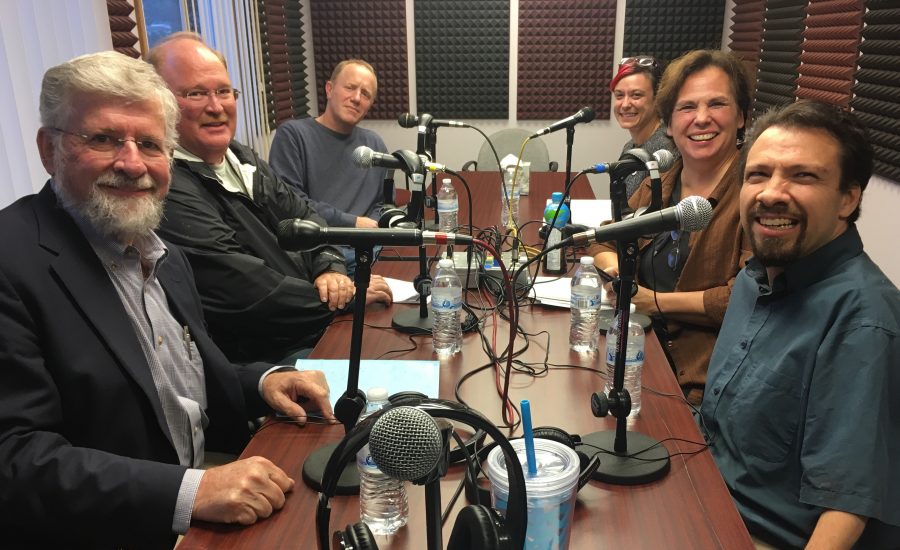
Ketchikan Gateway Borough Assembly candidates this year are, from left, Kent Colby, Alan Bailey, Joel Jackson, AJ Pierce, Sue Pickrell and Kevin Gadsey. (KRBD photo by Leila Kheiry)
All six candidates running for Ketchikan Gateway Borough Assembly participated in a Chamber of Commerce candidate forum Wednesday.
Alan Bailey, Joel Jackson, Kent Colby, Amanda (A.J.) Pierce, Susan Pickrell, and Kevin Gadsey fielded questions from moderator Michelle O’Brien during the one-hour forum. They were asked what qualities make them the best candidate, their approach to dealing with viewpoints they disagree with, and ideas about economic development.
Regarding the budget, candidates were asked if revenue should be increased or spending cut in order to sustain services.
Pierce says the borough has tightened its belt as best it can, but doesn’t feel raising taxes is the answer. She says she would like to see non-profits become more self-sustaining and feels there are economic opportunities.
“There are many options coming up in the technology industry – some 3-D printing things. I also understand that when you are in the electrical chip manufacturing industry, it requires a lot of water. Well, I know where we have a lot of water.”
Colby says one of the biggest employers in the community is government, and if government is thinned too much, revenue will be lost. He says there should be some tightening, but there shouldn’t be cuts for the sake of cuts.
“And it’s always the services that we need the most that seem to get the visibility and the cut. We do have to have some ways to increase revenue. Diversity, in my estimation, is the way to do it. We have to be careful when it comes to how many services that we do in fact cut.”
Jackson says raising taxes and making cuts send the message to the community and prospective businesses that the borough is not preparing for the future.
“We as a community have to act like Ketchikan has a future. And we on the assembly, along with other civic leaders, have to be the ones telling that story. I think that is really, sort of, the key thing here. I also think we cannot look to the state, and we cannot as an assembly, city council, or City of Saxman, blame the state for our problems.”
Gadsey says he is committed to programs and support networks in the community. He says it’s important to understand where borough powers lie and to work within that framework. Gadsey says borough staff cut their own budgets this fiscal year and he supports that approach. He says he also supports partnerships with social service agencies.
“…to be able to meet the needs and provide some of the resources in the community that the borough is doing, and probably will be able to do more effectively. Examples might be the Boys and Girls Club providing programs at the recreation center, or other educational or recreation activities.”
Bailey says he likes to take a common-sense approach, and does not agree that the only options are new revenues or cuts. He says he supports sharing services.
“There was an opportunity, at one time, for the maintenance program of the Ketchikan Gateway (Borough) School District and the borough (to share), and (that) would have eventually saved the borough and the school district substantial funds. So I believe the services or like services to be shared is also an option.”
Pickrell says economic development needs to be redefined. She says that does not mean new taxes. She believes non-profits provide valuable services, but does not consider those services economic development.
“Economic development is looking for grants to fund expansion of the shipyard. Economic development is encouraging our federal and state legislators to encourage the timber industry again. We are losing any people who know how to do any logging in this community, the same with the fisheries industry.”
Pickrell says she would like to see an economic development committee created.
A follow-up question addressed funding of non-profits. Candidates were asked if they had to choose between funding non-profits or investing in economic development, which they would choose.
Colby says he does not see it as an either-or choice and the scenario is unrealistic. He says both economic development and non-profits are important.
“We do have an opportunity to increase our economic base with business development, and we have a great opportunity to keep the non-profits viable and functioning and serving the part of the community that they do.”
Jackson says non-profits are businesses. He says, if elected to the assembly, he would advocate for any business that wanted to apply for economic development funds under established rules. Jackson says whether for-profit or non-profit, they should have business plans.
“If you can get past a bank and get a loan, that same rule should apply to anyone coming to the assembly, the city council or any other agency. There should be a high bar. And it should be fair.”
Gadsey says either-or thinking is bad thinking.
“What we would want to do is look at the amount of money we would have for both resources and be able divvy it up appropriately, understanding that we may not be able to meet everybody’s needs, but we would be able to meet some.”
He says he supports what the City of Ketchikan is doing, tying non-profit funding to a percentage of the previous year’s sales taxes.
Bailey says it’s not about either-or, but solving the issues. He says revenue needs to be generated to fund community programs. Bailey believes the solution is a per-person marine passenger tax.
“We can ask for a services fee, generating one dollar per head – that’s $900,000 on up – refer to it as a services fee, for the free bus rides. And we can defer that money to make sure that it’s properly handled by the CPV (Commercial Passenger Vessel tax) funding.”
Bailey says that would provide economic development funds without affecting community members or local businesses.
Pickrell says the assembly needs to define the types of non-profit services it wants in the community, and determine how much those services cost before allocating funds.
“I think it’s incumbent upon us as a community, and this includes the city council and Saxman. It includes the school district. Define what priorities we have, and start from there and then find the funding to cover that.”
Pierce says when talking about economic development, you are also talking about non-profits.
“I think, that being able to look at the entire edge of the coin, rather than just the two sides, is what we really need to be talking about. That can be done in a large round-table setting where more discussion is happening and there is more conversation on how we’re going to do that.”
The six candidates are vying for three three-year terms on the assembly. The municipal election is on Tuesday, October 3rd.





